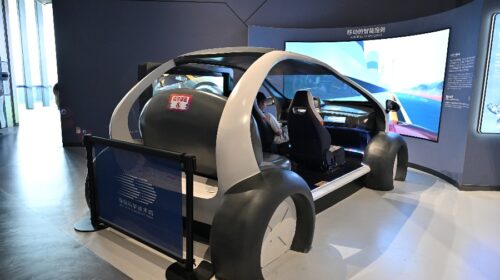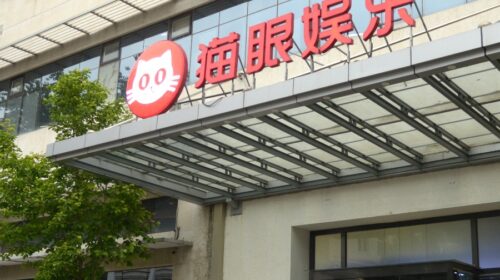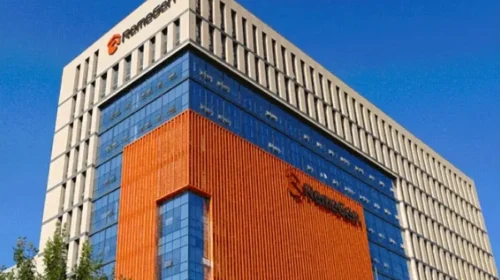Eshallgo looks skyward to cloud gaming to offset sputtering office business

The company announced a move into cloud-based games with Tencent as it struggles with plunging profits from its core office equipment business
Key Takeaways:
- Recently listed Eshallgo has launched a cloud gaming initiative with Tencent, with CS Asia Opportunities Master Fund providing $20 million in supporting financing
- Eshallgo’s shares fell 23% over five trading days after the deal’s announcement, as investors questioned the move so far from the company’s core office equipment business
By Edith Terry
Investors might be excused for wondering what office equipment supplier Eshallgo Inc. (EHGO.US) was doing with last week’s announcement that it was jumping into the cloud gaming business with industry giant Tencent (0700.HK). They had to sort through several other related announcements to figure out what was going on. And the more they read, the less thrilled they became, or so it seemed.
The main announcement that caught everyone’s attention came on Dec. 20, when Eshallgo announced a “far-ranging strategic move” to enter the Tencent business ecosystem by cooperating in the fields of office integration services and cloud gaming. The deal included an agreement with Tencent to develop cloud gaming consoles, as well as a sales agreement with Beijing Liuliuqiu Cultural Development for 1,000 cloud gaming consoles to kick things off.
As part of the move, Eshallgo’s announced its acquisition of D&K Asset Management in a stock-based deal consisting of a grant of 4 million shares. That gave Eshallgo access to Beijing Liuliu Ball, which will introduce a cloud gaming device that supports multiple cloud gaming services, including Microsoft Xbox Cloud Gaming and Nvidia GeForce NOW.
At least one investor who liked the idea was CS Asia Opportunities Master Fund, which injected up to $20 million in equity funding into Eshallgo to help fund the Tencent initiative by pledging to buy 4.17 million of the company’s shares for $4.80 each. The fund, whose investment was announced the same day Eshallgo disclosed the Tencent plan, said it believes Tencent’s backing will make all the difference for Eshallgo to grow its business.
Other investors weren’t so sure, reflected by a 23% decline in Eshallgo’s Nasdaq-listed shares in the five days after the announcement. After rising as high as $5 just before the announcement, the stock’s latest close of $3.52 on Thursday represented a 12% decline from its IPO price of $4.
The new Tencent tie-up looked designed to give investors cause for optimism as Eshallgo’s core business looks less-than-stellar with China’s slowing economy and a resulting slumping office market. The company’s revenue fell about 8% to $17 million in its latest fiscal year through March. Even worse, its profit nearly evaporated, totaling just $8,652 for the 12-month period compared with $477,689 the previous fiscal year.
How exactly Eshallgo’s venture into cloud gaming consoles with Tencent will work has yet to be explained, adding to investor skittishness. That will only add to anxiety over the company’s outlook and ambitions, which were badly hit by the Covid-19 pandemic and subsequent economic slowdown that have dampened demand for office-related services.
China’s office market has been sluggish and was obliterated for a few months in some of China’s major cities in 2022 as a result of pandemic restrictions. That market is crucial for Eshallgo’s current core businesses of selling and leasing high-end office equipment, together with after-sale maintenance and repair.
Eshallgo represents brands including HP, Epson, Xerox, Sharp, Toshiba, Konica and Kyocera, and has expanded to include everything from office furniture to IT products, water dispensers and printer paper. That market was worth an estimated $17.5 billion in 2023, about 10% of the global market, according to Cognitive Market Research. Eshallgo’s customers include such big names as Ping An Insurance, Taiping Life and Centaline Property.
Shifting market
Even before its Nasdaq IPO in July, Eshallgo said it was seeing a shift in the market for its after-sales maintenance services, according to its prospectus. In the six months through September 2023, the first half of its most recent fiscal year, its maintenance service income grew by 45.4% to $1.1 million. But its equipment sales revenue decreased by 16.2% to $6.5 million and equipment leasing revenue fell by 5.6% to just $722,601. Between its 2022 and 2023 fiscal years, it had already downsized its headcount from 172 to 157.
Eshallgo’s operating arm in China, Junzhang Shanghai, has 45% ownership in 24 subsidiaries, which in turn operate 155 service outlets across the country and employ 1,500 registered technical service personnel in lower-tier cities. Junzhang Shanghai had already acquired business licenses needed for e-commerce operations and developed proprietary software, remote management systems and mobile applications, “all of which await to be further refined and tested” after the IPO, Eshallgo said in the prospectus.
China’s office equipment supply industry, despite its huge size, is highly fragmented and competition is fierce. This may account for the drawn-out nature of Eshallgo’s journey to the Nasdaq and subsequent lackluster performance. The IPO itself took more than a year to finalize, raising a modest $4.7 million after its shares priced at $4, representing the low end of their range. Eshallgo previously filed for the listing in April 2023, at the time aiming to raise $15 million – three times the final total. In May 2024, it downsized that to $8 million, before downsizing again to the final amount.
So, has Eshallgo found a new way forward with its Tencent alliance? Improbable though it may sound, the answer could be “yes.” Its targeted niche is the gaming market’s console business, which was banned in China until 2015. Only 15% of China’s 685 million gamers use console hardware to play their favorite games, according to Sekkei Digital Group, and the market is less saturated than mobile or PC games. Revenue from the console hardware industry was $1.1 billion last year, with console software making $1.27 billion. The market is still growing, albeit slowly, and may reach a total of $2.48 billion by 2027.
Tencent has partnered with Nintendo since 2019, when Nintendo Switch was introduced in China. Nintendo accounts for 38% of revenue generated by the console video game market, followed by Microsoft Xbox with 33% and Sony PlayStation at 24%. Liuliu Ball could distinguish itself from the group with its plan to develop consoles that “support multiple cloud gaming services” through the “perfect integration of hardware and network resources,” according to the announcement.
Are there any parallels between selling office equipment and selling gaming consoles that Eshallgo can exploit? The company’s experience in developing a national infrastructure for supplying office equipment might be useful in creating a similar sales network for gaming consoles, even though the customer bases are quite different. And with the $20 million in new financing, combined with the $4.7 million from its IPO, and another $5 million it raised through convertible debentures in November, the company certainly has plenty of cash to spend on its new gaming foray.
To subscribe to Bamboo Works weekly free newsletter, click here






